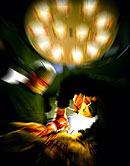- Recognizing the Signs of Hypothyroidism
- 10 Strategies to Overcome Insomnia
- Could Artificial Sweeteners Be Aging the Brain Faster?
- Techniques for Soothing Your Nervous System
- Does the Water in Your House Smell Funny? Here’s Why
- Can a Daily Dose of Apple Cider Vinegar Actually Aid Weight Loss?
- 6 Health Beverages That Can Actually Spike Your Blood Sugar
- Treatment Options for Social Anxiety Disorder
- Understanding the Connection Between Anxiety and Depression
- How Daily Prunes Can Influence Cholesterol and Inflammation
Healthy Blood Flow Seen a Year After Face Transplants


The blood vessels in face transplant patients reorganize themselves after the procedure, researchers report.
During a full face transplant, the recipient’s major arteries and veins are connected to those in the donor face to ensure healthy circulation. Because the procedure is new, not much was known about the blood vessel changes that occur to help blood make its way into the transplanted tissue.
The development of new blood vessel networks in transplanted tissue is vital to face transplant surgery success, the investigators pointed out in a news release from the Radiological Society of North America (RSNA).
The researchers analyzed blood vessels in three face transplant patients one year after they had the procedure at Brigham and Women’s Hospital in Boston. All three had excellent blood flow in the transplanted tissue, the team found.
“We assumed that the arterial blood supply and venous blood return was simply from the connections of the arteries and the veins at the time of the surgery,” study co-author Dr. Frank Rybicki, director of the hospital’s Applied Imaging Science Laboratory, said in the news release.
It turns out this is not the case, the researchers noted.
“The key finding of this study is that, after full face transplantation, there is a consistent, extensive vascular reorganization that works in concert with the larger vessels that are connected at the time of surgery,” study co-author Dr. Kanako Kumamaru, a research fellow in the laboratory, said in the news release.
The study was scheduled for presentation Wednesday at the RSNA’s annual meeting, in Chicago. Data and conclusions should be viewed as preliminary until published in a peer-reviewed journal.
More information
The American Academy of Facial Plastic and Reconstructive Surgery has more about face transplantation.
Source: HealthDay
Copyright © 2026 HealthDay. All rights reserved.










